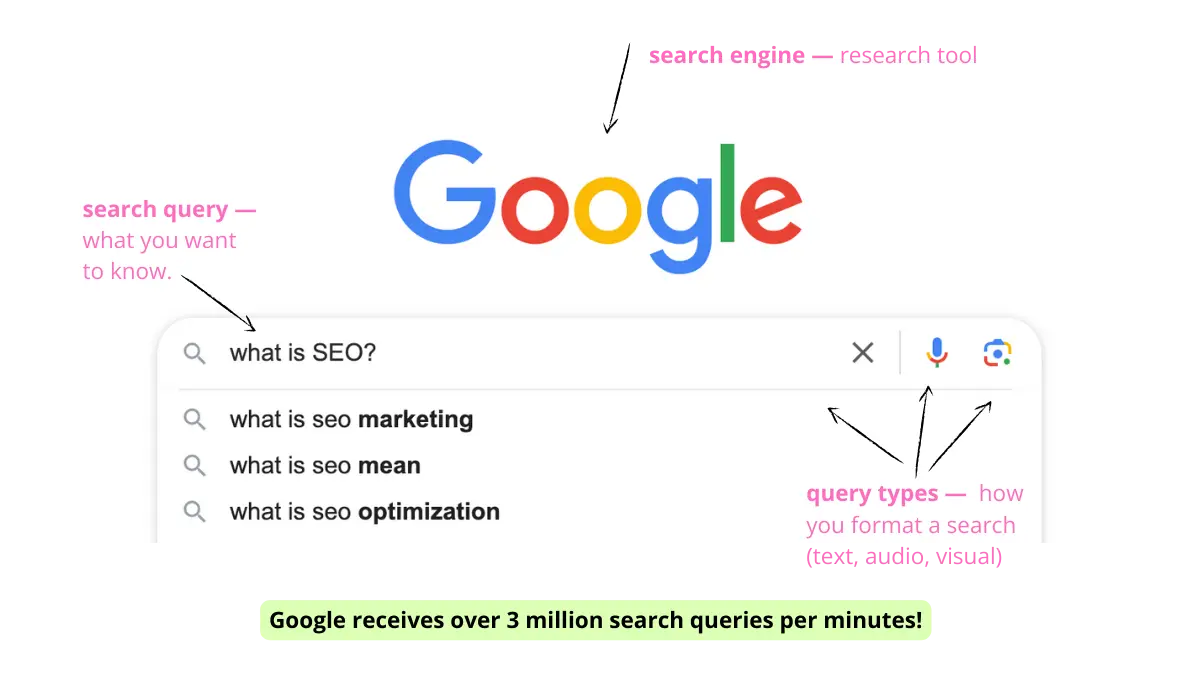The year 2024 has marked a decisive shift in digital marketing: long-form content that prioritizes people first is becoming the norm. The cookie-cutter strategies that once defined SEO are no longer effective. In fact, content stuffed with keywords and clearly written for search engines is now penalized.
As we head into 2025, Google’s focus continues to be on fresh, nuanced content that surpasses generic, AI-generated summaries. Recent algorithm updates evaluate content based on relevance, originality, and depth.
Let’s explore how to shape your SEO content strategy in 2025 based on Google’s evolving priorities.
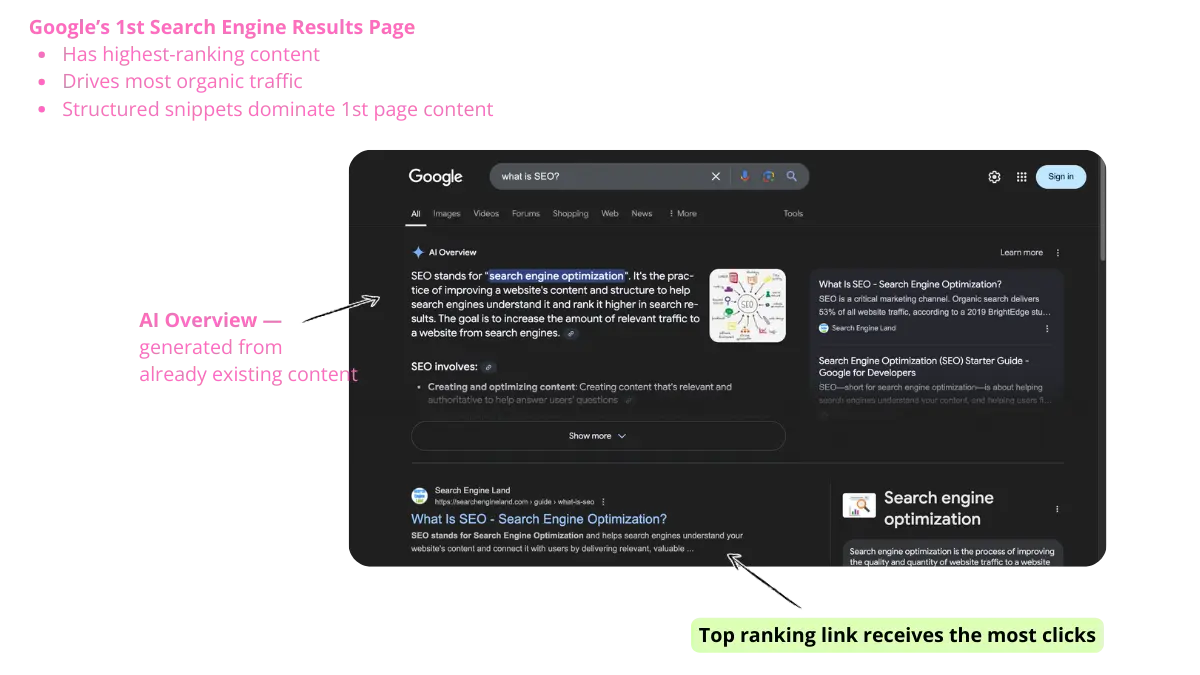
What is SEO?
Search Engine Optimization (SEO) is the process of refining a website so that search engines like Google can:
- Identify what your site is about.
- Understand its relevance to a user’s search query.
- Evaluate how valuable the content might be to users.
When done effectively, SEO increases your chances of ranking higher on the first Search Engine Results Page (SERP). Ranking in this coveted position drives more organic traffic to your website, establishes brand authority, and ultimately converts readers into customers.
Without SEO, even the best content can remain buried in search results, making it difficult for your target audience to find your services or offerings.
If you’re new to SEO, Google offers an excellent starter guide to get you up to speed.
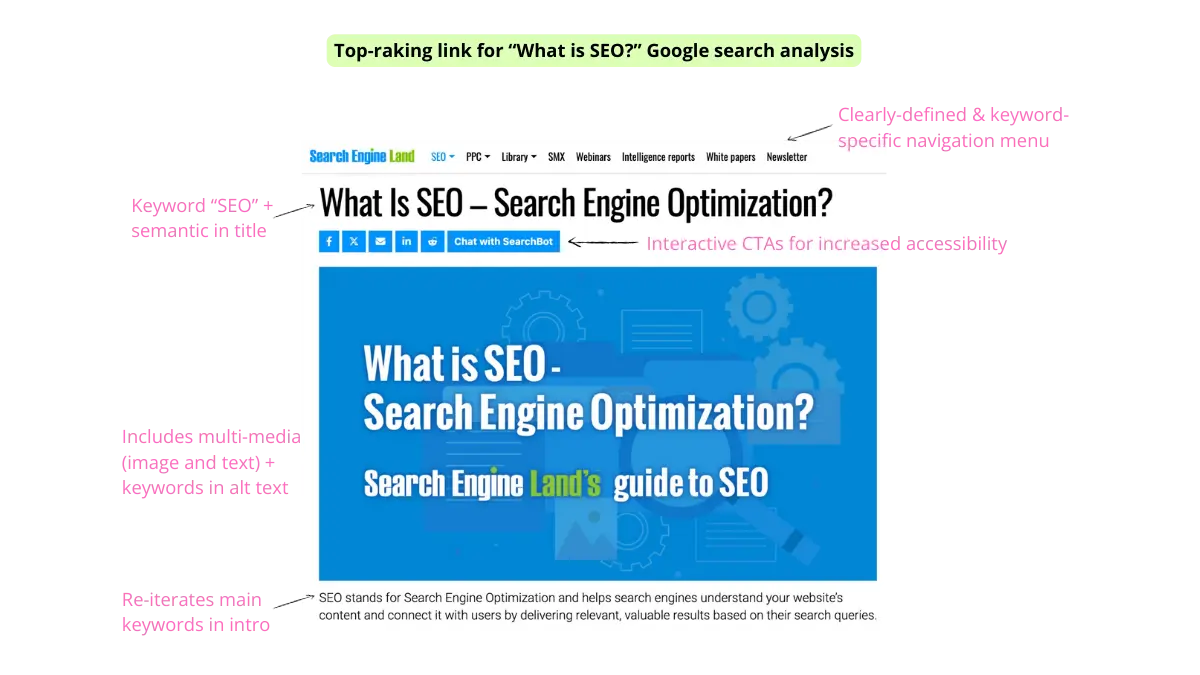
How to Plan SEO Content Strategy in 2025
An SEO strategy is a plan to optimize your website so it has the best chance to appear on Google’s first page of search results. You approach to this plan can vary widely depending on your business goals, available resources, and base knowledge. But if your goal is to increase your brand authority on Google in 2025, you must account for technical SEO, on-page SEO, and off-page SEO ranking factors — and implement them well.
Keep in mind that Search Engine Optimization is a long-term growth strategy. It might take anywhere from a few hours to a few months before Google catches up with your changes. For faster visibility, pair your SEO efforts with complementary strategies like paid ads or social media campaigns.
The Influence of AI Content on Rankings
AI content generation tools, like ChatGPT, have transformed content creation. These tools allow for the rapid production of articles, but this surge of AI-generated content has flooded the internet with material that often prioritizes quantity over quality. While Google doesn’t penalize AI-generated content simply for its origin, it does evaluate it based on quality and usefulness.
How to use AI effectively:
- Use AI tools to structure ideas, streamline research, or generate outlines.
- Enhance this content with personal insights, real-world examples, and unique perspectives to make it human-centered and valuable.
By leveraging AI responsibly, you can combine efficiency with originality to create content that meets Google’s expectations.
What Google Looks for in Your Content
When Google launched in 1998, its algorithms primarily relied on simple metrics like keyword density and citation links. But as website owners exploited these loopholes, Google adapted its algorithms to prioritize helpful, reliable, and people-first content.
Today, Google’s ranking system functions much like the levels of comprehension described by Mortimer J. Adler in How to Read a Book. Just as readers build understanding by analyzing different layers of a text, Google evaluates content in stages, starting with meaning and culminating in context.
Here’s how to align your strategy with Google’s five key signals:
1. Meaning – Superficial Understanding of Your Query
Google begins by interpreting the meaning of your query. It uses natural language processing (NLP) to analyze keywords, their combinations, and the context in which they appear. This helps it identify literal meanings and infer nuanced interpretations.
For example, a search for “jaguar logo” in Nov. 2024 prioritizes search results about the car company’s new logo, reflecting Google’s ability to link queries with current events.
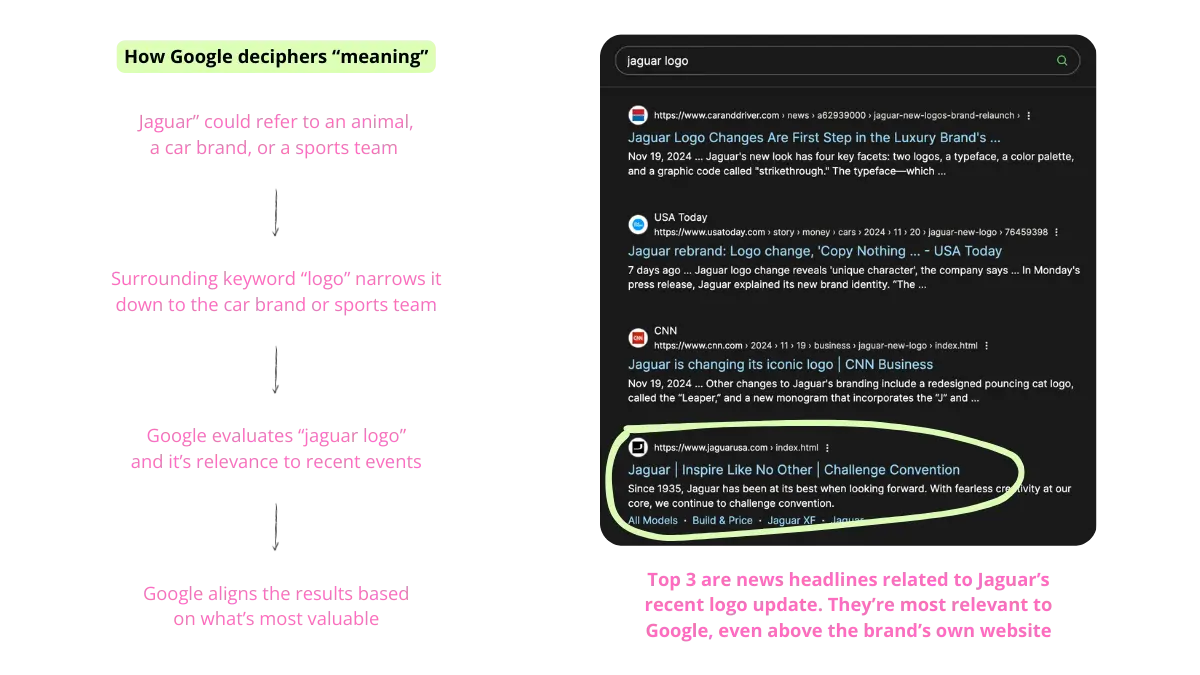
Actionable Tips:
- Write for search intent: Include clear, conversational language in your headings and subheadings. Most people search using “how/where/why” phrases, so tailor your titles to match this format.
- Use semantic keywords: Avoid keyword stuffing. Instead, include synonyms and related terms to create richer context for Google.
- Make your content scannable: Use headings, meta descriptions, and bullet points to help readers (and Google) quickly identify key takeaways.
2. Relevance – Aligning Content with Search Intent
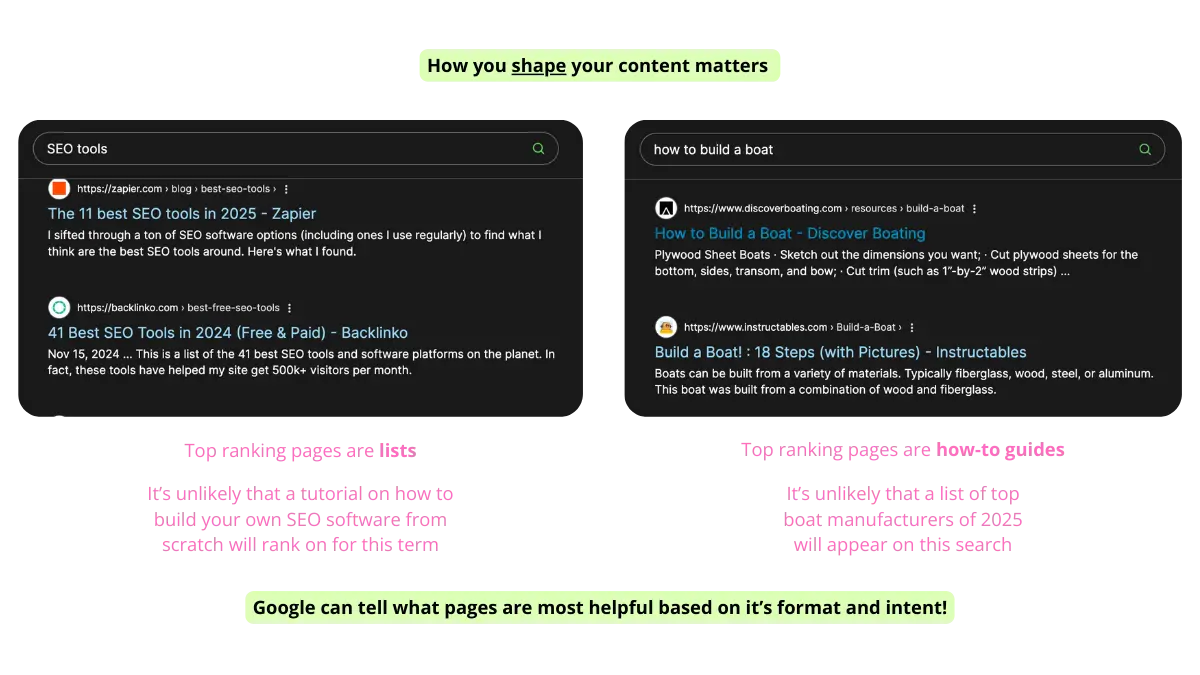
Once Google understands your query, it assesses whether the content aligns with the searcher’s intent. Is the user looking for a guide, a list, a video, or something else?
Actionable Tips:
- Know your audience: Identify what users are truly seeking based on their queries. For example, someone searching “how to build a boat” likely needs a step-by-step guide, not an academic paper.
- Diversify your formats: Offer content in multiple formats (e.g., articles, videos, infographics) to cater to different preferences.
3. Quality – Expertise, Authoritativeness, and Trustworthiness (E-E-A-T)
Google’s quality signals are deeply rooted in its E-E-A-T framework (Experience, Expertise, Authoritativeness, Trustworthiness). These signals aim to ensure that users receive information that is not only accurate but also comes from credible, knowledgeable sources. This is particularly important for Your Money or Your Life (YMYL) topics, which influence health, finance, or legal decisions.
You can think of Google’s quality ratings as the number of times an academic paper, or in this case, your website, is cited by others. Just as you evaluate a book’s evidence by checking who discovered it, their expertise, and their reputation, Google evaluates websites in a similar way.
Actionable Tips:
- Show expertise: Invite experts to collaborate in articles that include their expertise and original perspectives in your writing. Ideally, you want to interview them and use their words in your content.
- Update content regularly: Tell Google that you’re an expert in your field by keeping your existing content as fresh as possible. This shows that you’re constantly evolving in the field and keeping your audience in the loop.
- Cite credible sources: Back your claims with credible, peer-reviewed sources, such as academic papers, government websites, or well-known industry authorities. Make sure to link your content to the source material they reference.
For a quick SEO win on existing content, make sure that website visitors can clearly tell who authored it. Include a detailed author bios with all collaborative blogs or posts with any credentials, relevant experience, and other publications that positions them as a thought-leader.
4. Usability – The Reader’s Experience
Imagine buying the next book in your favorite series, only to find random pages are missing when you get home. Frustrating, right? You’d probably put it down immediately. Even the most informative content won’t succeed if users struggle to access or navigate it.
This same principle applies to websites. If a website is disorganized or missing key elements, visitors will leave just as quickly. Google prioritizes websites that deliver a seamless, enjoyable user experience.
Actionable Tips:
- Optimize for mobile: The majority of searches are mobile. Use responsive design to ensure readability on all devices.
- Speed up your site: Compress large images, reduce unnecessary scripts, and enable caching to improve load times.
- Brand your 404 pages: A custom 404 page with links to key content (and branded design) can help retain users who land on broken links.
5. Context – Connecting Content to Broader Knowledge
Google values content that contributes to ongoing discussions, provides diverse perspectives, and is interconnected with authoritative ideas.
Actionable Tips:
- Build internal links: Connect related pages on your site to create a robust content network.
- Engage in your niche: Publish guest posts, collaborate with industry experts, and participate in relevant forums to position your site as part of a larger conversation.
- Offer unique insights: Combine your expertise with visuals, case studies, or contrasting viewpoints to stand out.
Use descriptive anchor text that clearly indicates the topic of the linked content, helping both users and search engines understand relationships between pages.
Conclusion
Mastering Google’s five key signals — meaning, relevance, quality, usability, and context — is essential for any modern SEO strategy. By following these principles, you can create content that’s not only optimized for search engines but also genuinely valuable to readers.
Start your 2025 SEO strategy today by focusing on people-first content and adapting to Google’s ever-evolving algorithm. The effort you put in now will set the foundation for long-term success in the digital landscape.
Not sure where to begin? Request a free SEO audit for your website!
